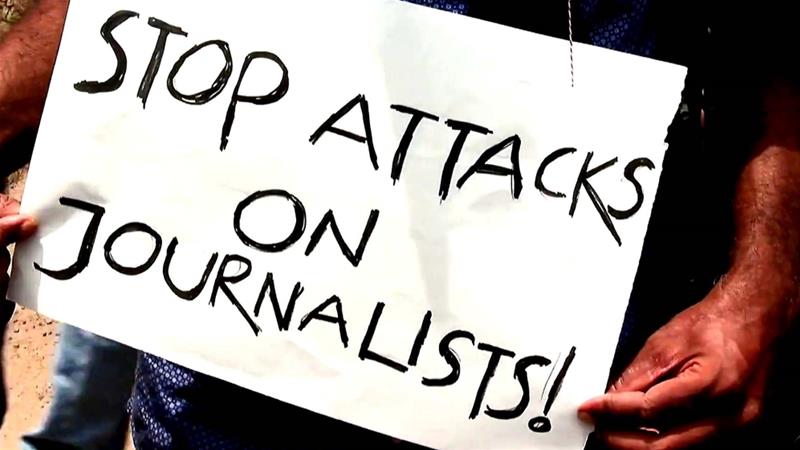Pakistan’s first ever book offering an intimate look into the harsh every-day life of journalists working in hostile conditions has been launched. The book, “Reporting Under Threat,” is authored by renowned media analyst and media development expert Adnan Rehmat, and includes testimonies of courage in the face of impunity by journalists.
The book was launched in Islamabad on March 19, 2014 at a ceremony attended, among others, by Federal Minister of Information and Broadcasting Pervaiz Rashid, Committee to Protect Journalists (CPJ) Board Director Katy Marton, Member of National Assembly Haider Rizvi, Freedom Network Executive Director Iqbal Khattak, Civic Action Resources Executive Director Zaigham Khan, senior journalists Hamid Mir, Mazhar Abbas, Pervaiz Shaukat, Afzal Butt, Shahryar Khan and dozens of representatives from the media, civil society and international media support organizations.
The book includes testimonies from 57 Pakistani journalists, including editors, reporters, cameraperson, sub-editors, news directors, photographers, correspondents and stringers working for TV channels, newspapers, radio stations and magazines.
According to Civic Action Resources and Pakistan Federal Union of Journalists over 100 journalists and media workers have been killed and more than 2,000 injured in Pakistan since 2000. Considering the high risks that about 20,000 active journalists in the country face, it is ironic that most people who benefit from their work have no clue to the conditions they work in – from navigating a climate of fear to dealing with the dilemma of their right to safety clashing with the people’s right to know; and from the woeful inadequacy of safeguards for them to the compromises they have to make to continue reporting. “Reporting Under Threat,” says author Adnan Rehmat, is an attempt to fill this critical gap: to hear the stories of Pakistan’s daily storytellers.
In an attempt to convey the immediacy of the daily tribulations they face, the book helped the journalists featured tell their stories in their own words. Hence the accounts are the journalists’ very own – in first person singular and make for riveting reading. In some instances, the book also brings forth the stories of journalists who lost their lives – their stories are narrated by their close friends, all fellow journalists who worked with them and knew them well.
The book asked the journalists to preferably tell a specific story from their lives that could illustrate the kinds of dangers they face – an instance where they found themselves in deep trouble and even a brush with death. All these stories relate to journalists’ work, not their non-journalism related life. The stories reveal the risks to them and the vulnerabilities they face in a milieu like Pakistan’s where conflict, violence and extremism have made journalism one of the most difficult professions to practice in recent years. These here, then, are stories that have taken a great deal of courage for journalists to tell. They range from the alarming to the hair-raising. From murder to kidnap, and from torture to harassment – and nearly everything else in between – it’s all here.
These profiles of courage represent the broad gamut of media and journalism work in Pakistan – geographically they’re from virtually all regions of Pakistan. Testifying to their vulnerabilities are journalists of both genders – men journalists facing up to their captors and killers, and women journalists facing the brunt of harassment and intimidation – the accounts offer a representative sample of threats they face daily.
Also revealed from the stories is the broad spectrum of actors that bring terror to journalists’ lives: the government, political parties, security forces, intelligence agencies, militants, terrorists, religious leaders, feudal landlords, businessmen, even civil society organizations – they figure here in the hall of shame of actors tormenting Pakistani journalists.
Freedom Network, Pakistan’s first media-watchdog organization monitoring violations of media freedoms, welcomes the publication of “Reporting Under Threat” and considers it the first ever systematic documentation of the evidence on impunity against journalists in the country. By speaking out and speaking about the threats they face, FN said, the brave Pakistani journalists are directly contributing to the efforts of stakeholders, including the Pakistan Coalition on Media Safety (PCOMS) to combat impunity against media in the country.
Adnan Rehmat, author of the book, published with support of Open Society Foundation, has agreed to allow Freedom Network to serialize the book and its component stories of 57 journalists on its website.
Stranger Than Fiction – True Stories of Pakistani Journalists
- March 20, 2014
- 6:56 am
- No Comments
More from the News section
July 26, 2023
No Comments
June 20, 2023
2 Comments
March 21, 2023
No Comments
August 30, 2022
No Comments
August 30, 2022
No Comments
Resize text-+=
